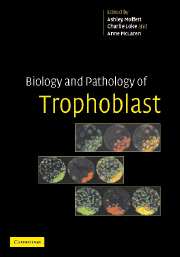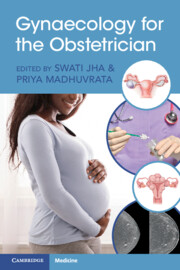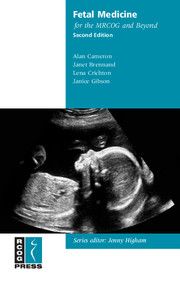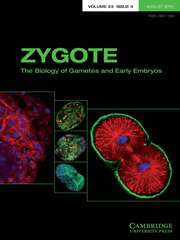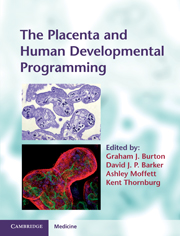Biology and Pathology of Trophoblast
This is the first dedicated, in-depth account of trophoblast: the tissue derived from the fertilized egg that nourishes and protects the developing fetus. The cells of the trophoblast have many unique qualities, and exhibit great variability across different species. It has a fascinating role in the development of the placenta and as a regulator during early growth of the embryo. These aspects are all fully covered as well as studies on why it is not rejected by the mother as 'foreign' tissue. This volume provides an up-to-date summary of the state of current knowledge and offers some glimpses as to future development on the scientific and clinical front.
- Covers reproductive immunology, genetics and pathology
- Basic science and clinical aspects dealt with in depth
- Of interest and relevance to all who study the placenta
Reviews & endorsements
"Readers who want a more scientific treatise on the wonders of the placenta should peruse Biology and Pathology of Trophoblast...provide succinct yet comprehensive introductions to a number of important immunologic concepts pertinent to the process of placentation and the maintenance of pregnancy. Many interesting facts about placental immunology are shared."
Drucilla J. Robers, M.D., Massachusetts General Hospital, New England Journal of Medicine.
Product details
May 2006Hardback
9780521851657
292 pages
254 × 178 × 19 mm
0.747kg
Temporarily unavailable - available from TBC
Table of Contents
- Preface Charlie Loke
- Chair's introduction Anne McLaren
- 1. Trophoblast cell fate specification: discussion James Cross
- 2. Stem cells: pluripotency and extraembryonic differentiation in the mouse Tilo Kunath
- 3. Epigenetic regulation of trophoblast development P. Hajkova, S. E. Erhardt and M. A. Surani
- 4. Regulation of X chromosome inactivation in relation to lineage allocation in early mouse embryogenesis Neil Brockdorff
- 5. Gestational Trophoblastic disease R. A. Fisher and N. J. Sebire
- 6. Trophoblast and the first trimester environment Graham J. Burton, Eric Jauniaux
- 7. Implantation is a sticky situation Olga Genbacev, Akraporn Prakobphol, Russell A. Foulk and Susan J. Fisher
- 8. Trophoblast regulation of maternal endocrine function and behaviour E. B. Keverne
- 9. Molecular signalling in embryo-uterine interactions during implantation S. K. Dey and Susanne Tranguch
- 10.Trophoblast and pre-eclampsia C. W. G. Redman, I. L. Sargent and E. A. Linton
- 11. Trophoblast and uterine mucosal leukocytes Ashley Moffett
- 12. Immunology of trophoblast: a reappraisal Charlie Loke.

